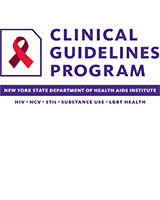From: Rapid ART Initiation

Rapid ART Initiation [Internet].
Radix AE, Fine SM, Vail RM, et al.
Baltimore (MD): Johns Hopkins University; 2023 Feb.
Copyright © Johns Hopkins University Clinical Guidelines Program 2000-2024. The Clinical Guidelines Program, a collaborative effort of the NYSDOH AI and the Johns Hopkins University School of Medicine, Division of Infectious Diseases, encourages the use, reproduction, and distribution of original documents and related graphics from this program website accompanied by a full citation of source that includes: Author(s). Committee. Title. Date of publication. Full URL. Date accessed. Links to pages on this Clinical Guidelines Program website are also encouraged and may be created without seeking permission. Requests to adapt material, i.e., to change or alter in any way material from this website for inclusion in another publication, should be sent to [email protected]. Please include detailed information about the intended use and desired adaptations.
This book is licensed under the terms of the Attribution-NonCommercial-NoDerivs 3.0 Unported (CC BY-NC-ND 3.0).
NCBI Bookshelf. A service of the National Library of Medicine, National Institutes of Health.